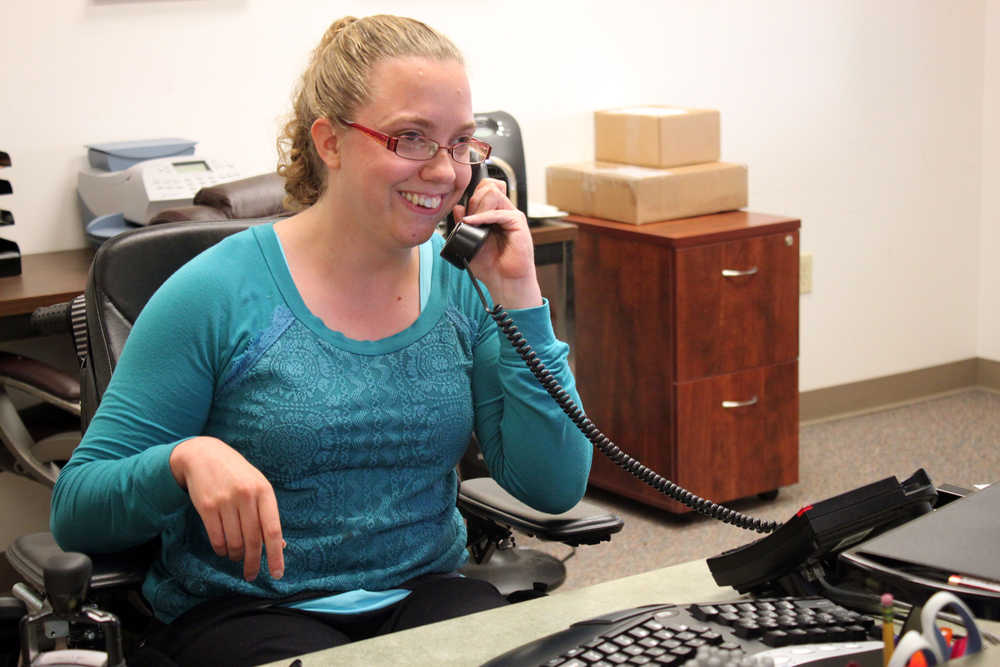After 20 years of serving people with intellectual and developmental disabilities in Southeast, Hope Community Resources is pulling out of the region at the end of the month.
“This was an agonizing decision,” Hope CEO and Executive Director Roy Scheller said Friday by phone. “As Alaska is moving into this current downturn, we just could not see any future in which, at least in the next decade, we could sustain what we were doing in the Southeast.”
The Anchorage-based nonprofit has offices throughout the state in the Mat-Su Valley, Seward, Soldotna, Kodiak, Dillingham and Barrow, serving about 1,000 people with disabilities. Scheller said its Juneau and Ketchikan offices provide services to about 36 people — 29 in Juneau and seven in Ketchikan.
Sara Kveum is one of them. She was born with cerebral palsy and has received support from Hope since she was a kid.
Now, she’s 28 and lives in her own apartment in the Mendenhall Valley. A team of five to six Hope employees helps her on a daily basis with things like dressing, showering, brushing her hair, exercising, cooking, taking her shopping and to appointments.
“They keep me in check and make sure I’m doing OK,” Kveum said.
When she first heard the news that Hope was leaving Southeast, “I didn’t like it. I thought I was going to have to lose my whole team. I didn’t know what to think,” Kveum said.
“It’s very hard for people with physical and intellectual disabilities to deal with change,” she added.
Scheller understands this but said the cost of doing business in Southeast is high, a lot more than in Anchorage and other regions. There is a pay differential, benefits cost more, the cost of things like rentals, leases, vehicles and gas are all higher.
With Hope offering the same rate for services throughout the state, revenue from services in Anchorage heavily subsidized the rates in Southeast, Scheller said.
“We were able to make do for a long time, but as the economy has softened all through Alaska, where we were making money, we are now just breaking even, and so where we were losing money has become that much more significant,” he said.
Usually, Hope loses just over $200,000 in providing services to Southeast. Last year, it was creeping up to $300,000. Part of that loss came from supporting a staff of about 57 full- and part-time employees.
“In Anchorage, we’re serving 700 people so our infrastructure can be paid for or afforded, where we are serving only about 36 people in the Southeast but having to keep a workforce there that costs more than we were earning in delivering those services,” Scheller said.
Hope told its clients and staff about ceasing services in Southeast in June. A transition team has been working to place clients with other agencies. Some Hope staff have moved to those agencies, a few are relocating to work for Hope elsewhere and some have left the field.
As Hope’s final day in Southeast approaches at the end of September, “it’s become apparent that there’s not enough people to go around to fill this gap,” said Kim Champney, Chief of Services at REACH. “It’s very difficult to find people who’ll do this work. It puts a strain on the system.”
REACH is the biggest provider of disability services in Juneau, providing support for about 250 people. It’s picking up many of Hope’s clients; so is TIDES and Consumer Direct Care Network Alaska.
While fitting in 29 additional clients doesn’t seem like a lot, “we struggle to even provide services for the people we’re currently serving,” Champney said.
She said REACH plans on starting a more aggressive recruiting plan, but Hope leaving Southeast is a big shift.
“We have 10 part-time openings, 15 full-time openings and we’re getting two to three applications a week. Those are openings for tomorrow — somebody needs care and we don’t have somebody to do that care,” Champney said.
Luckily for Sara Kveum, her transition to REACH is expected to go smoothly. Some people on her current support team will stay with her and she’s already familiar with the organization; she’s been receiving supported employment with REACH for the past four years.
“I’m very comfortable switching over to REACH,” she said. “I think the transition will be good.”
On top of providing services to people like Kveum, Hope runs an assisted living group home in Juneau off the Back Loop Road that will be closing in November.
Teddy Castillo’s sister Gloria has lived at Jeffrey’s Hope for four years.
“She’s settled in there. She likes her housemates, she enjoys the staff and now it’s been kind of stressful because we have to transition her to some new place,” Castillo said.
At this point, Castillo can’t say definitively where her sister will live next, but she’s confident she will find a placement.
“I think Hope has the best interests of their clients in mind,” she said. “And everybody is working hard and doing their best to see how they can meet the need that Hope provided.”
The search, though, has made Castillo realize there just aren’t enough caregivers for people like her sister — someone with an intellectual disability and physical limitations.
“If people feel like they have some time and they would like to work with local families who need help, there’s an opportunity out there to help other people.”
• Contact reporter Lisa Phu at 523-2246 or lisa.phu@juneauempire.com.

